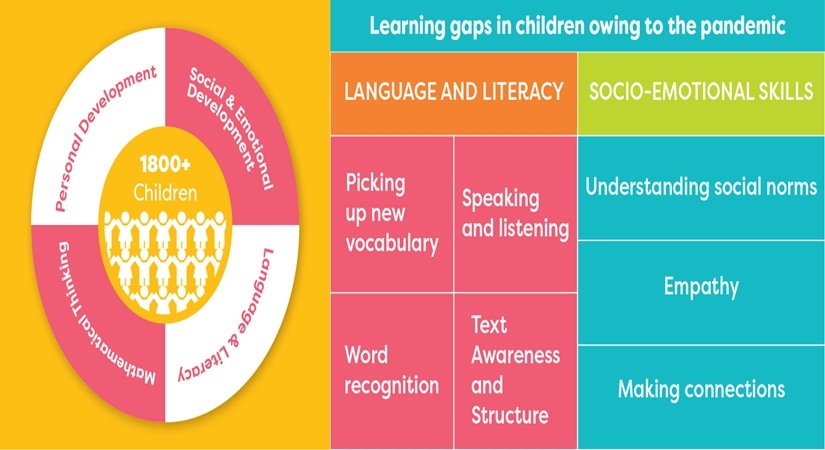After two years of little or no formal schooling, KLAY Preschools and Daycare undertook a qualitative investigation over the course of five months to discover learning gaps in children. 1800+ children between the ages of 2 and 6 were observed by KLAY teachers for their personal, social, and emotional development, language and literacy, and mathematical thinking.
Language Development
Language Development encompasses listening, speaking, and building vocabulary, which are the first few steps towards building communication skills in young children. It has been observed that there are some significant milestones yet to be achieved in the areas of language development among children in the age-group 2-4 years.
These milestones have been observed in specific areas, such as; picking up new vocabulary and comprehending textual content e.g toddlers were seen struggling to use verbal and nonverbal language to express their needs. Whereas kindergarten children are not finding it difficult to express their emotions, form complex sentences (by joining smaller sentences) or reason out details in a text/story.
Lack of appropriate stimulation and exposure to more digital content vs physical reading material could be the reason for this.
Understanding Social Norms
Social and Emotional Development, which is linked to a child’s ability to make connections in a social environment was a key area where learning had been disrupted for all age groups. In this category, understanding social norms and empathy were seen as the top skills which were disrupted.
Understanding social norms
Children quickly absorb rules that govern everyday interactions in a social setting. Owing to the lack of social interactions in the last two years, skills associated with an individual’s discipline like taking turns, sharing toys/food, respecting the speaker or even saying ‘Hello’, were seen missing. Inattention, clinginess, increased stranger anxiety, inattention and in some cases, high levels of stress, were observed.
Empathy
Empathy is closely related to the emerging sense of self in early years which helps them realize that they are separate from others but are still connected. It is considered to be a higher-order skill though children start developing it in the early years. Simple milestones like responding to a smile/laughter, or identifying with a peer’s emotion, or making friends are signs of empathy and this was seen missing in children, possibly due to lack of opportunities to develop personal connections in a social setting.
Commenting on these findings, Arshleen Kalra, Curriculum Head at KLAY said, “The insights from our study indicate a correlation between lack of formal learning, social settings, and the learning gaps observed in children after returning to school. In the last 2 years, the absence of social interactions, passive screen time and even wearing masks have impacted the early language development and expressive vocabulary of young children. The unavailability of opportunities to develop personal connections has greatly impacted their ability to become socially adept. This is based on initial observations and to prevent long-term impact, educators and parents need to work together to bridge the gaps by creating ample opportunities for learning and exploration at home and at school.”










